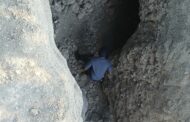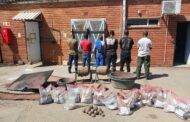 Chilean miners who survived 18 days after a cave-in received hydration gel and medication through a narrow drill hole on Monday, but officials said it could be months before the men are freed.
Chilean miners who survived 18 days after a cave-in received hydration gel and medication through a narrow drill hole on Monday, but officials said it could be months before the men are freed.
In what relatives called a miracle, the miners on Sunday tied a note to a perforation drill that had bored a shaft the circumference of a grapefruit to where they are located, 2,300 feet (700 meters) vertically underground.
The accident in the small gold and copper mine has turned a spotlight on mine safety in Chile, the world’s No. 1 copper producer, although accidents are rare at major mines.
The incident is not seen having a significant impact on Chile’s output.
Mining Minister Laurence Golborne said rescue workers began sending plastic tubes called “doves” containing glucose solutions, hydration gels and medicine down to the miners to keep them alive while they dig a new shaft to extract them. That could take up to four months.
The miners have not been told how long it will take, but they may only emerge from the mine at Christmas.
“We are well. We’re waiting to be rescued,” Luis Urzua, shift leader at the mine, told Golborne by radio link as the trapped miners applauded, cheered and sang Chile’s national anthem.
Golborne said the miners were in remarkably good condition and spirits despite their ordeal. It is one of the longest periods that trapped miners have survived underground.
“The wait is very different now,” said Elias Barros, 57, whose brother is among those trapped. “It is a wait free of anguish. This isn’t over, but we are much more hopeful it will end happily.”
Relatives wrote letters to send down the shaft to the miners to help boost morale during the long wait ahead. Golborne said relatives had joked he should send cold beer down the drill hole.
Andre Sougarret, manager of state copper giant Codelco’s El Teniente mine, who is heading up the drilling effort, said engineers would drill two other shafts. One would be to ensure ventilation and communication in the coming months and another, wider one to bring the miners to surface using a pulley.
Engineers are transporting a more powerful drill from another mine and must decide where to bore the larger hole without risking further cave-ins at the unstable mine. Sougarret said it would take three to four months to drill the extraction hole.
The miners are 4.5 miles (7 km) inside the winding mine. They sheltered in a sparse 540-square-foot (50 square metre) refuge, an area the size of a small apartment, which contains two long wooden benches. They have now moved out into a tunnel because of ventilation problems, Sougarret said.
WATER, VENTILATION SAVED MINERS
Tanks of water and ventilation helped the miners to survive, but they had limited food supplies. Health officials estimate they may have lost about 17.5 to 20 pounds (8 to 9 kg) each. The men rationed out the provisions they had, eating two mouthfuls of tuna and half a glass of milk every 48 hours, a local senator said.
Rescuers lowered a television camera down the bore-hole on Sunday and some of the miners looked into the lens. Some had removed their shirts because of the heat in the mine and officials said they looked better than expected.
The miners used the batteries of a truck in the mine to power lights and charge their helmet lamps.
“The miners are alive, but the job is not done yet,” President Sebastian Pinera said in the capital, Santiago, pledging to tighten labour safety regulations.
Pinera has fired officials of Chile’s mining regulator and vowed a major overhaul of the agency in light of the accident.
Analysts say the feel-good factor of finding the miners alive, coupled with the government’s hands-on approach, could help Pinera as he tries to push through changes to mining royalties that the centre-left opposition had shot down.
As night fell on Sunday, jubilant relatives of the trapped miners gathered with rescue workers around bonfires for a barbecue, celebrating with traditional live music and dance as a cold fog enveloped the mine head.
On Sunday night, thousands of Chileans honked their horns and burst into applause at restaurants when they heard the news.
“This was a 17-day nightmare,” said 42-year-old miner Sandro Rojas, whose brother, two cousins and nephew are among those trapped. “When I see my brother, I’m going to tell him I love him and smother him with kisses. To be honest, I don’t know if I’ll be able to speak I’m so excited.”
The government says the San Jose mine, owned by private company Compania Minera San Esteban Primera, has suffered a series of mishaps. Sixteen workers were killed in recent years.
The miners’ plight has drawn parallels with the story of 16 people who survived more than 72 days in the Andes mountains after a 1972 plane crash. Their story was later made into the Hollywood movie Alive.
[Reuters]






















